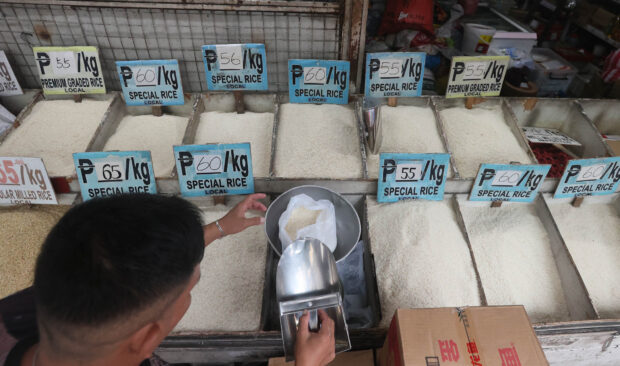
A vendor tends to his rice stall in Cartimar, Pasay city on monday as the price ceiling for regular and well-milled rice in the country will be effective on September 5, tuesday at P41 and P45 per kilogram. Malacanang declared the executive order in response to the increasing prices of rice caused by several factors such as illegal price manipulation, rising oil prices and global conflict.
INQUIRER/ MARIANNE BERMUDEZ
MANILA -Overall inflation in the Philippines revved up to 5.3 percent in August, after waning throughout the previous six months to bring the average since January to 6.6 percent, according to the Philippine Statistics Authority.
National Statistician Dennis Mapa said the uptick was partly due to a faster increase in the prices of milled rice.
Mapa said that in August, regular milled rice cost P42.70 per kilo—at a nationwide average—or 8.9 percent more than it did in the same month of 2022.
Likewise, well-milled rice cost P47.63 per kilo or an increase of 8.1 percent year-on-year.
Even then, Mapa said the biggest contributor to higher inflation in August were vegetables and tubers, particularly tomatoes. Prices of this commodity group surged by 31.9 percent.
Cap on prices
The latest inflation data was announced in time with the start of the implementation of price caps on milled rice through Executive Order (EO) No. 39, at a time of high farm-gate prices of palay as well as of imported grains due to export bans in exporting countries like India and Myanmar.
Considering these developments, Secretary Arsenio Balisacan of the National Economic and Development Authority (Neda) said the government would strengthen its measures to ensure food security, protect consumers and provide assistance to farmers.
“Despite the ongoing challenges we encounter, such as severe weather conditions and trade limitations imposed by other nations, our objective remains to achieve an inflation rate between 2 percent and 4 percent by the year’s end,” he said
Balisacan said that aside from these factors, “the alleged hoarding incidents, artificial shortage and speculative business decisions of market players may have put further upward pressure on the domestic retail price of rice.”
Assistance to farmers
He stressed the importance of providing comprehensive assistance to rice and vegetable farmers to help them increase their production.
Also, the Neda chief recommends hastening the implementation of programs to facilitate the swift recovery of production in typhoon-affected areas.
Further, Balisacan said that the government needs to accelerate the rollout of the Food Stamp Program (FSP) in order to swiftly aid low-income consumers.
“The FSP is one of the priority programs of the Department of Social Welfare and Development (DSWD), which will provide P3,000 worth of food credits to target beneficiaries each month for six months.
Also, DSWD will provide P15,000 to small-scale rice retailers affected by the EO No. 39 through the Sustainable Livelihood Program. The government will also provide assistance in transporting rice sacks from farmer cooperatives and traders to retailers and wholesalers. Moreover, the Office of the President will augment the funding needed to ensure assistance to retailers.
“To partially counterbalance the rise in global prices and alleviate the impact on consumers and households, we may implement a temporary and calibrated reduction in tariffs,” Balisacan said INQ